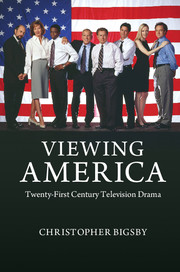Chapter Nine - Mad Men (AMC 2007–2014)
Published online by Cambridge University Press: 05 June 2014
Summary
Each day men sell little pieces of themselves in order to try to buy them back each night and week end with the coin of ‘fun.’ With amusement, with love, with movies, with vicarious intimacy, they pull themselves into some sort of whole again.
C. Wright MillsThe shadow of this period [the sixties] overhangs the rest of the century not just intellectually but emotionally.
Matthew WeinerIn March 2012, Newsweek magazine published an issue that mimicked the style of the 1960s. Even the advertisements borrowed the aesthetic of a decade now fifty years in the past. The reason for this retrofitting was the imminence of the fifth season of a television series which, while never commanding large audiences and having been absent from America's screens for nearly a year and a half, had nevertheless had a disproportionate effect.
Mad Men, set in the 1960s, accurately reflects more than the style of that period. This was a time when women, in particular, were required to play a subordinate role, as they had, indeed, in Newsweek itself until 1970 when a class action suit was brought against it claiming gender discrimination. The first episode of the new season (in fact, a double episode) included a scene taken directly from a New York Times article of 1965 that described the way in which civil rights demonstrators were abused by those in the crystal towers of Madison Avenue, where quite a different version of America was being manufactured by advertising agencies. Mad Men's achievement, indeed, was to capture the shifting values of Americans through its dramatising of those working in such an agency dedicated to selling a version of the country often at odds with the private no less than the public world.
- Type
- Chapter
- Information
- Viewing AmericaTwenty-First-Century Television Drama, pp. 357 - 404Publisher: Cambridge University PressPrint publication year: 2013



